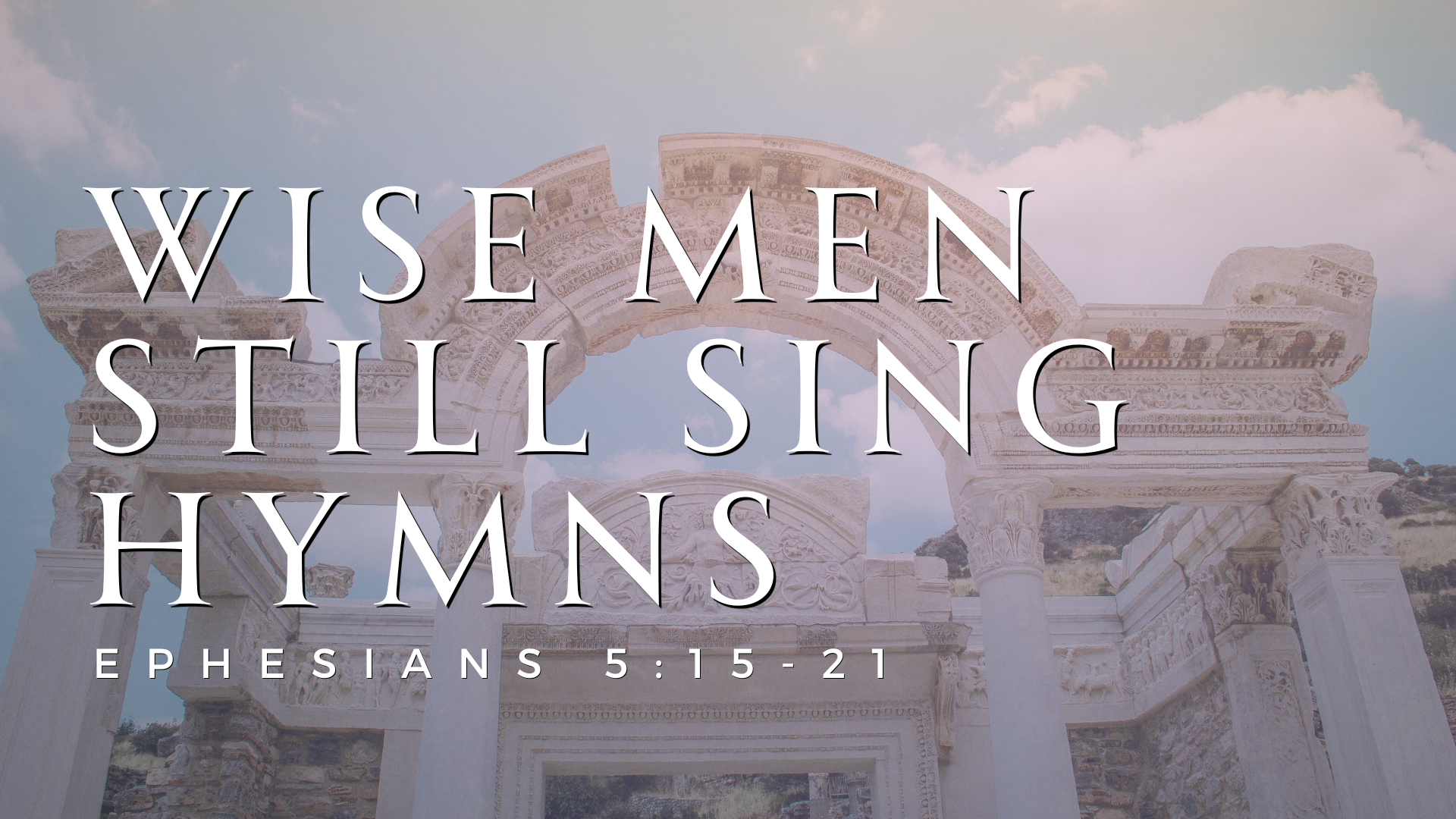
Walk This Way (Ephesians 4:1)
Ephesians 4:1 – Therefore I, the prisoner in the Lord, urge you to walk worthy of the calling you have received
Be All You Can Be is one of the most effective marketing slogans of all time. Many of you can probably sing the jingle from those classic commercials.
I didn’t realize the U.S. Army had retired Be All You Can Be as their slogan back in 2001. It was replaced for five years with Army Of One. Starting in 2006, it was Army Strong.[1] Tax-payers paid an ad agency $200 million a year for that campaign, by the way.[2]
But, great news: In March of 2023, it was announced that the classic is back. The army’s slogan is, once again, Be All You Can Be, which was voted the 18th best ad campaign of the 20th century.[3]
This morning we’re going to focus our attention on just one verse. It’s in Paul’s letter to the Ephesians – a book that explains to us just how wonderful salvation is and how it changes our lives. In the first three chapters, Paul overflows with excitement and explanation of all the things that come bundled with salvation. When we believe God and accept this free gift He offers in Jesus, along with eternal life we get every spiritual blessing in heavenly places. We’re given a place in His unfolding, cosmic plan and God starts to make these incredible mysteries known to us and through us so that all the world and all the universe can see the immeasurably great power of God’s grace and kindness working toward us. We hear about how we get hope and unity and access to God Himself and an everlasting inheritance and inner strength and ever-increasing wisdom and perspective on life. All this and more is laid out by Paul in the first half of Ephesians.
Then in the second half, Paul pivots and says, “Ok, now that you know what you’ve got, here’s what to do with it. Here’s how to apply it. Here’s how salvation operates in your mind and in your relationship and in your life.” Chapters 1 through 3 are “what is,” chapters 4 through 6 are “how to.”
Paul begins the “how-to” part of the book with a phrase that sums up all the details in chapters 4 through 6 – a kind of slogan for saved people. The slogan is: Walk worthy of the calling.
It’s not like the Army’s ad campaign. Paul wasn’t recruiting. His listeners were faithful saints already. Ephesians 4 through 6 is not about how you make yourself worth saving or how to make yourself worthy of God’s love. He already loves you and, if you’re a Christian, all of these things in chapters 1 through 3 are already true about you. But since they’re true, life will never be the same.
This verse has been called the church’s mission statement.[4] In it, Paul gives direction in how to walk in God’s power – how to be what God has made us to be. It’s not just because we “should” or because God wants to heap obligations on us. It shows us how we can cooperate with God in His world-changing work, how we can stay undefiled as we move about in the world, and how we can enjoy more and more of what God wants to give us.
Paul begins with the word therefore. It’s a term that means “accordingly,”[5] or a “marker of result.”[6] If you read through Ephesians this week, you’ll find a lot of doctrine, details about the mysteries of God, and now, because these things are true, your life is going to change.
Imagine you were born with no legs. You lived many years unable to stand or walk or move around on your own. Then you go to a doctor, and he performs a surgery that not only gives you legs, but also the ability to use them. You wake up from the anesthesia and the doctor says, “The surgery was a success. You can stand and walk.” That surgery would bring you into a new reality of living – a marked result. Life would change on a fundamental level with a new world of opportunities.
If you’re a Christian, that means you have received God’s salvation. It’s not just abstract or metaphysical. It’s given for your day-to-day life. Therefore, what should I do? Paul will elaborate in some very specific ways, but it boils down to: Walk worthy.
Paul talk to us about many aspects of life – as church members, as neighbors, as spouses and parents. He’s going to talk about our speech and our interaction with society and our business relationships. But, of course, he can’t cover everything.
The good news is that, no matter what situation you find yourself in, this simple principle is your guiding light. Walk worthy of the calling.
F.F. Bruce writes, “There are many situations in which we shall find no detailed precept of Scripture to tell us what to do, but here is a principle to guide us in every situation: which course of action will be most worthy of the calling with which God has called us?”[7]
Paul urges us to walk worthy. He thinks this is absolutely needful. But notice the grace of his plea. He could have said, “I demand,” but instead he used a term that can mean, “I encourage, I comfort, I warn.”[8] One dictionary gives this definition: to call you near.[9]
Paul used the same word that Jairus used when he fell at the feet of Jesus and asked Him to, “Come and lay Your hands on my daughter so she will get well and live.”[10] Come near. Don’t be afraid to draw close to your Savior. You’re invited to walk in an intimate, personal relationship with your Savior.
Walking is such a helpful image when it comes to understanding the Christian life. Walking means movement – forward progress toward a destination. It means we’re headed somewhere and experiencing all sorts of terrain along the way. It’s also something that can be done at a variety of paces, sometimes with others, sometimes on our own. No matter the circumstances, it’s a step-by-step endeavor.[11] Paul could’ve used any analogy he wanted. He did not say, “I urge you to fly worthy on eagles wings.” He didn’t urge us to leap or pole vault worthy. Walk worthy.
In the Bible, ‘walking’ means our way of life. Back in Ephesians 2, Paul said, “You were dead in your trespasses and sins in which you previously walked according to the ways of this world.”[12]
Psalm 1 famously presents life as a walk in one of two directions: Either the way of the Lord, leading to life, or the way of the wicked, leading to destruction.
To walk means our conduct,[13] our thought and behavior,[14] or “follow a prescribed way in a fixed order.”[15] One commentator says, “[it’s] comparable to the march of Israel under God’s guidance in the wilderness.”[16] As the Israelites moved from Egypt to the Promised Land, they weren’t just given the destination address and then left to their own devices. Awhile back, I had an appointment in Fresno, so I opened my Maps app and plugged in the address and had my choice of 3 routes. But our walk to glory isn’t like that. We’re led step-by-step along the way. That’s what the Lord did for Moses and the Israelites. “Here’s where we’re going, but this is the first stop. And we might stay here for a few days or a few weeks, then move on over to this next location.” God had a prescribed order for them. He had the destination locked in and the route to get there.
Ephesians 2:10 (NKJV) says: “For we are His workmanship, created in Christ Jesus for good works, which God prepared beforehand that we should walk in them.”
The way we walk, it’s quality and character, should be worthy. The term means appropriately.[17] It also is a term that means well-balanced. Does the way I walk balance with what I say I believe? When it comes to my life, does my faith have legs? Does my conduct match my creed?[18]
Physical balance was something I took for granted before my stroke. Now, things just aren’t quite the same. We had a hilarious experience two Christmases ago. We were at a place where there was a suspended bridge that I had been on many times before. It’s built with strong planks and steel cables, but it does sway and roll a bit when you walk on it, especially if your kids run across.
I got about half way across and when the bridge started to move and my legs just stopped working. My brain was telling them to step and adapt to the motion, but I just couldn’t. It felt very strange and it was absolutely hysterical. I have to pay more attention to balance now.
Imbalance is much less fun on the spiritual level. When our spiritual lives are unbalanced between belief and practice, we end up becoming like the priest and Levite in Jesus’ parable of the Good Samaritan. These two men were professionally religious. They knew everything you could humanly know about the Word. They oriented their lives around piety and religiosity. But, as they were walking, they saw a man, beaten and dying on the road, and they crossed to the other side so they could pass him by. No compassion. No balance between belief and practice. Their faith was unworthy of the love of God. It wasn’t appropriate. It didn’t fit.
Ok, then what are the things I need to do in order to walk worthy? Paul does give direction. In verse 17 he says, “No longer walk as the Gentiles do,” and will explain what that means. In chapter 5 he says, “walk in love,” and “walk as children of light,” and, “pay careful attention to how you walk.” But the primary principle is to consider your choices and determine if they are worthy.
Worthy of what? Paul wraps up this verse by saying, of the calling you have received. You see, these believers had already been called, just as Paul had, just as we have. This isn’t about earning salvation. This isn’t about how to make yourself likable to God. These Christians were faithful, but they weren’t finished. And that’s, hopefully, where you find yourself today: Faithful, but unfinished. Following God, being conformed into the image of Jesus Christ. None of us are going to be finished on this side of eternity. But we can walk forward in a way that is worthy of our calling.
God called you from eternity past. Paul discusses this in chapter 1. In Romans 8 he explains that we are called according to God’s purpose. Unfortunately, calling is a word that can easily be reduced down to people who go into specific types of ministry. We think of vocational missionaries being “called” to a certain place or tribe.
The fact is, all of us are called by God in more than one way. When we read the Bible we find that God’s call is general, it is categorical, and it is personal.
God’s call is general in the sense that every human being is called to repent of their sin. God calls all people out of darkness, into His marvelous light. Not everyone will answer that call, but it is sent to everyone. God calls every Christian to take up their cross and follow Him. The way that works out in an individual’s life will vary, but the call is for all of us. We are all called to one hope, one Lord, one faith, one baptism, one God and Father. We are all called to be holy and blameless. We are all called to love the Lord our God and love our neighbor as ourself. We are all called into fellowship with Jesus Christ.[19]
So in these ways, God’s call is general. Any one of us can apply these callings to our lives right here, right now.
But then we find that God’s call is also categorical. In Ephesians, Paul spends time talking about some of these categories. Are you a husband? Here’s what God calls you to do. Are you a wife? Here’s God’s calling for that category. Are you a parent or a child, or a worker? The New Testament is full of callings that apply to you when you’re in certain categories. If you’re single, the calling to love your wife as Christ loves the Church does not apply to your day-to-day living.
And then we find that God’s calling is personal. God has a particular route carved out for you – good works He wants you to discover and walk in as He leads you. At one point, Jesus revealed a little of this to Peter and Peter pointed at John and said, “Well, what about that guy?!?” Jesus said, “That’s not your business.” Not because Jesus had a different standard for John, but because, on the personal level, God had a specific calling for Peter’s life and a different calling for John’s life.
The Book of Acts is full of examples of personal callings. Philip, get up and go south to the road that leads from Jerusalem to Gaza. Peter, head to Caesarea. Paul, don’t go to Asia, go to Macedonia. This is why it’s so important to have a real relationship with God the Holy Spirit, Who gives us guidance for our personal situations. People sometimes say, “Should I take this job?” I don’t know. And, you know what, in some cases, the Bible will not specifically tell you. Of course, Scripture does guide us and can be applied to specific circumstances, but there is no verse you can turn to right now that says, “Should I promote at my job or not.” But the Holy Spirit will guide you into wisdom for your personal calling.
There are times when we’ve been told, “you guys need to do more direct application in your Bible studies.” Maybe that’s true. But, at the end of the day, I’m not the Holy Spirit! I don’t know exactly what God wants to do in and through your life. So, what we think is more important is to present what the Bible says and then encourage you to take your life and God’s word and god to the Lord and say, “Lord, how do You want me to apply this in my life? I want to walk with You but I don’t know the way unless You show me.” He knows the way and He wants you to discover it.
Now, God’s personal calling on your life is His decision. It is based on God’s gifting, not our wanting. As we conform to the image of Jesus Christ and our hearts align more and more with His, He gives us the desires of our hearts.[20] But that doesn’t mean we get to choose what the Lord does with us. Whatever it is, your personal calling is going to align with the way the Lord has spiritually gifted you, with the guiding principles of Christianity, and with the character of Jesus Christ. Meaning that, if we’re walking worthy, we’ll never bypass humility, graciousness, integrity, peaceableness, generosity, compassion, patience, self-control, unity.
Sometimes we see prominent Christians behaving in ways that bypass those qualities and, when that happens, they are outside God’s calling on their lives. It doesn’t matter if their ministries are successful or if they’ve sold a million books or have a ton of followers. If you look at the fruit of their lives and see pride, malice, self-aggrandizement, these sorts of things, then they are not walking worthy. Because God has fixed a way and say, “This is the way, walk in it.”[21]
Walking worthy of our calling is not always easy, but it is always possible. Paul himself is an object lesson of how possible it is. I skipped a phrase in the verse. Paul said, I the prisoner in the Lord.
For two years, Paul sat in a Caesarean jail. He then spent multiple years imprisoned in Rome, chained to soldiers around the clock, where he wrote this letter. He was there because God asked him to be there.
It’s a great reminder that you can walk with the Lord even if you’re shut up in your house. You can walk worthy if you’re inside, outside, weak or strong, lots of money, no money, sick or healthy. It’s a Green Eggs And Ham situation. In the dark, in the rain, on a train, in a tree. In the corner office or in a prison cell. Because walking with God is about living life with Him – being led by Him. Responding to His calling on your life. He’s calling each of us in all sorts of ways right now. Some we know, some we’ve yet to discover. But, as we live out these lives, we’re invited to walk worthy – to live in balance – knowing what salvation is really about and why it matters – where our faith has legs, strengthened and empowered by the grace of God, to make progress on the path He’s drawn for us, leading to glory.
We are His people, we are His army, and we can be all that He’s made us to be as we walk worthy of the calling we have received.
| ↑1 | https://military-history.fandom.com/wiki/Slogans_of_the_United_States_Army |
|---|---|
| ↑2 | https://www.nbcnews.com/id/wbna15197720 |
| ↑3 | https://recruiting.army.mil/News/Article/3327601/in-with-the-old-the-army-rebrands-with-a-familiar-slogan/ |
| ↑4 | CSB Study Bible Notes |
| ↑5 | A Concise Dictionary Of The Words In The Greek Testament And The Hebrew Bible |
| ↑6 | The Dictionary Of Biblical Languages With Semantic Domains: Greek New Testament |
| ↑7 | F.F. Bruce The Epistle To The Ephesians: A Verse-By-Verse Exposition |
| ↑8 | Markus Barth Ephesians 4-6: Introduction, Translation, And Commentary |
| ↑9 | CDWGTHB |
| ↑10 | Mark 5:22-23 |
| ↑11 | Darrell Bock Ephesians: An Introduction And Commentary |
| ↑12 | Ephesians 2:1-2 |
| ↑13 | The NET Bible First Edition Notes |
| ↑14 | The Teacher’s Bible Commentary |
| ↑15 | Barth |
| ↑16 | ibid. |
| ↑17 | CDWGTHB |
| ↑18 | R. Kent Hughes Ephesians: The Mystery Of The Body Of Christ |
| ↑19 | 1 Corinthians 1:9 |
| ↑20 | Psalm 37:4 |
| ↑21 | Isaiah 30:21 |








